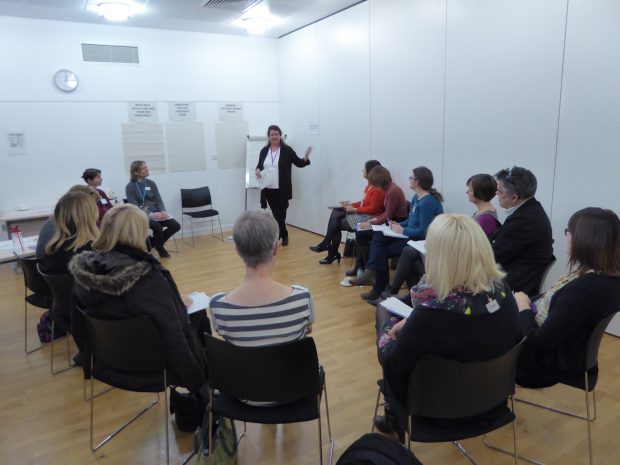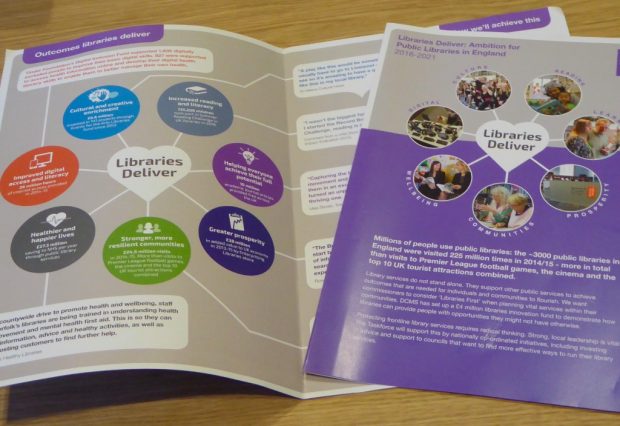[Editors note: This post is the fourth in a series which collates and shares the content of workshops given during the recent Libraries Deliver: Ambition sector forums.]
Introduction
As mentioned in our earlier post, we offered a range of workshops during our sector forums in Newcastle, London, Bristol and Birmingham. In the latter 3 venues, not all the people at the event could attend all the sessions, so the Taskforce is using this series of blog posts to enable everyone to see the presentations and get a flavour of the discussions that took place. The workshop: ‘Making the case for libraries’ was held in all 4 locations, a total of 13 times, and 161 people took part.

Workshop content
These sessions took the form of workshops, starting with an introduction to the main area of Libraries Deliver: Ambition that relates to communications: Section 7: Making the case for libraries. I described how the Taskforce has gone about establishing its own communications channels and shared a handout which listed these for reference. They are:
- Libraries Taskforce on GOV.UK (used for our more formal communications - including our membership and terms of reference, publication of reports, minutes of meetings and toolkits)
- Libraries Taskforce blogs (a more informal communication channel - showcasing innovations, sharing good practice, providing more detail on events, etc. We also invite guest authors to write posts sharing their views and experience)
- @LibTaskforce Twitter account (for alerts, and taking part in the daily flow of conversations about library matters)
- Libraries Taskforce flickr account (photographs of libraries we have visited, plus graphics, and now also for publishing photos on behalf of library services. This latter is linked to the Public libraries free to use images group)
I also explained about the Communications Sub-Group which was set up initially to provide better co-ordination between Taskforce members, but had since been extended to encourage participation from a wide number of representatives from across the library sector.
One of the activities this group took part in was a workshop in December, where, amongst other things, we looked at ways to best capture what went on at the sector forums and how to encourage engagement. This resulted in a number of volunteers stepping forward to help at each event - in roles including; taking over the Taskforce twitter account for the day, carrying out a series of interviews with participants and gathering short vox pops (audio or video clips), or attending and taking notes of the workshop sessions and panels.
I said there was always space for more participation as we need to ensure that the communications work we do reflects what the sector needs, and invited anyone present to either consider joining, or nominating a member of their teams to join. I have added 3 new names to the group since the workshops - anyone else who is interested, please email the Taskforce.
Following this introduction, I then described 3 topics taken from Section 7 and invited members of the group to share their thoughts and ideas.
The three topics were:
Advocacy - which was defined as the activity around championing libraries to decision makers
Publicity - the activity needed to make the case for libraries to the general public
Assets - the materials needed to inform and support the above activities
Each of these overlaps somewhat, but some common themes arose. These both reflected, and gave more depth to, the themes that came up when I first joined the Taskforce and worked on a communications strategy, as well as the ideas that were put forward during the consultation on Libraries Deliver: Ambition.
What people said about advocacy
“Share best ways of engaging with councillors - eg. we invite councillors to our busiest mobile stop where they can meet constituents, talk in a library context, and see how services work”
“Need to instill more confidence - shift the narrative from “we can help with that…” to “we deliver that” or “we lead on that” or “we are the best people to do that””
“We need a playbook - how to find out what pushes local buttons, then how best to do it”
Common themes included remembering to go beyond the usual suspects - don’t just approach your own portfolio holder, but think of who else is a stakeholder. Lots of people talked about needing the right messages for the right people.

Participants really liked the 4 page brochures we had produced to accompany Libraries Deliver: Ambition, recognising that both it and printed copies of the full document were useful advocacy tools that helped to start conversations. The suggestion of creating more brochures to illustrate specific outcomes (for example a health-focused brochure), and one directly designed for frontline staff, was also welcomed and endorsed.
What people said about publicity
“How about a library equivalent to Trip Advisor?”
“Don’t forget humour - unusual/quirky is key and attracts attention”
“We should learn from others - NYPL campaigns and ALA Libraries Transform are great”
“Raising public awareness of libraries MUST BE THE #1 aim”
“Actively cultivate local celebrities to retweet library material“
A common theme was: make sure frontline staff are involved. They need to be clear about what the activity is and what it contributes to. They need to see the whole picture so they can understand why monitoring participation is important.
There was general recognition that all of Section 7 was important - publicity must be constant as even the basics of what libraries offer are unknown by many members of the public. This was expanded as people talked about the need for good news stories to counteract/balance the negative closures and cuts narrative. Journalists are quick to publish bad news; you have to work hard to sell positive stories.
National awareness and delivery at local level is important. Lots of participants mentioned the Summer Reading Challenge as an established programme that provided high quality assets that could then be used locally. The Shakespeare campaign that ran during 2016 was also mentioned.
Many mentioned the need to celebrate national stories to give confidence - eg. Leeds libraries taking the lead on ‘Digital Leeds’. And there was a widespread wish to cultivate key champions in the media (both national and local).
What people said about assets
“We’d like picture/visuals showing the areas libraries contribute to - as an alternative to ‘simple’ visitor stats”
“Where is best to find good examples? Which channel can every one look at? Which channel DOES everyone look at??”
“What about a podcast series for staff - sharing stories/interviews?“
Common themes were consistency and guidance about good tools and how to use them. As many cited capacity pressures, staff don’t often have time to investigate alternative options and said they would welcome clear advice, checklists, templates and support. People wanted any materials to be concise, easy to use, in a range of formats and adaptable to local circumstances.
I’d really like to explore further with participants who said they were setting up processes to encourage junior staff to help create content - whether it was interns being handed responsibility for the instagram account, or a team of new members of the team contributing to social media.
There was a wide range of views around the use of social media, sometimes (but not always) linked to the constraints put on teams by corporate communications teams, and access to the main channels used. There was underlying nervousness about what to do when social media ‘goes wrong’ (a common comment, which covers a range of issues), and perhaps the feeling that using social media isn’t really a library job. All can be addressed through guidance and leadership. In making the case for libraries as rooted in their communities and responding to user needs, library staff need to be engaged in conversations those users are having, in whatever channels they are active. Therefore, it is no longer the case that a digital profile is ‘nice to have’. It should be an essential part of a library’s communications approach.
What happens next?
Overall, I found the workshops both stimuIating and reassuring. The former as they brought out so many good examples of activities that are already going on around the country, and the latter as they confirmed the programme of activity that we are working on.
With a focus on the priority actions already in the Libraries Deliver: Ambition Action Plan, informed by feedback from the Communications Sub-Group workshop and the sector forum sessions, a programme of activity is coming together. Next steps are likely to include:
creation of another brochure on Libraries Deliver: Ambition aimed at library workers. We’ll be looking for people to test this and comment before we go to print.
work to develop a set of key messages: an ‘elevator pitch’ - ideas for how to respond when you get asked the “what’s the point, they are all closing aren’t they?” question, plus lines that provoke the response “I didn’t know libraries did that”
production of a “facts and stats pack”, supported by a key references list
continued development and promotion of the collection of copyright free images (both photographs and infographics)
advice and guidance on communications. As one of the most common messages was about lack of capacity (in particular, time), we’ll explore making this a flexible resource - available as a structured/participatory training programme, but also something that can be dipped into.
And finally, we’ll continue to promote good practice from around the country. Primarily via the Taskforce blogs at the moment, but we’ll also work with Taskforce partners to identify longer-term sustainable places to collect or collate material.
If you have any views to share on this topic, please either email us or leave a comment below.
To keep up to date with Taskforce activities, remember to follow us on twitter, or subscribe to our blogs.
1 comment
Comment by Dr Malcolm Rigler posted on
I found the account of this work very interesting. I believe that there is a case for a Group of NHS General Medical Practitioners to be brought together as a focus group to explore with the taskforce how the library service can support NHS General Medical Practitioners . See the "Quotes" section on our website at : http://www.librariesandhealth.com . Best wishes Malcolm